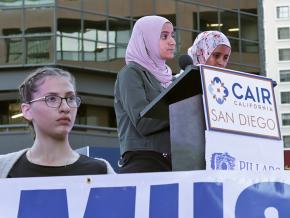Their ban will tear families apart
and report from San Diego on a rally to protest the Supreme Court ruling approving the Trump administration Muslim ban.
DURING A week of protest in response to the inhumane treatment of migrant children at the border, San Diego activists also gathered to support Muslim refugees who will be affected by the Supreme Court’s decision to uphold the Trump administration’s racist travel ban on June 26.
About 200 people turned out the day after the ruling for a rally called by the Council on American-Islamic Relations (CAIR), Pillars of the Community, and other activist and religious groups.
In its 5-4 decision, the Supreme Court ruled in favor of the ban in the name of “national security,” which they ruled outweighed the possible harm to people seeking asylum.
As Mukund Rathi pointed out at SocialistWorker.org, “immigrants and refugees stuck at borders or in countries wracked by U.S. imperialist violence will bear the brunt of the legal and political uncertainty.”

But attendees of the June 27 rally are vowing to continue to defend Muslim immigrants.
“I can promise you as many civil others rights organizations and coalitions, and CAIR California, will make the same promise,” Susanne Arani, a civil rights attorney, told the crowd. “Attorneys like us will continue will continue to fight the Muslim ban. As Americans, we need to buckle down, get organized, speak up and speak out every time single we see an act of discrimination.”
SEVERAL SPEAKERS told their own stories as immigrants to the U.S., including a member of the Partnership for the Advancement of New Americans:
I came to the United States as a refugee from Somalia when I was just 5 years old. I came to this country without my mother. On July 11, it will be the 22nd year that we have been separated.
The Supreme Court today has given President Trump a green light to tear families apart and runs counter to the inclusion principles that our country aspires to. As a first-generation refugee, I face many obstacles, including language barriers, secure housing and xenophobia. This isn’t the first time the Supreme Court has been fallible.
Another activist, Sarah Farouf, said:
The Supreme Court ruling that we woke up to today is not the first of its kind. We look up to the Supreme Court or higher means for justice, but we were let down. But let me remind you that the U.S. has a long history of injustice and oppression.
I’m an Iraqi Muslim American who came to this country to seek refuge from a war — a war that was created by this very country. I’m here as a result of the Iraq War, an unjust war that was based on unsubstantiated claims of weapons of mass destruction.
Many of the people who spoke were infuriated by the Court’s decision. Many emphasized voting this upcoming November to vote people in who will represent us.
Rally organizers spoke about protesting the inhumanity of the Supreme Court’s ruling alongside combating the Trump administration’s zero-tolerance policy on immigration, showing how people are people are drawing the links between these unjust policies.
“I think we should definitely vote,” said one young Muslim woman, “but I don’t think it should end there. We should take more of a stance such as this one and make our voices heard. Even if we do vote, younger generations like myself can’t vote yet, unlike coming here to support our communities.”


